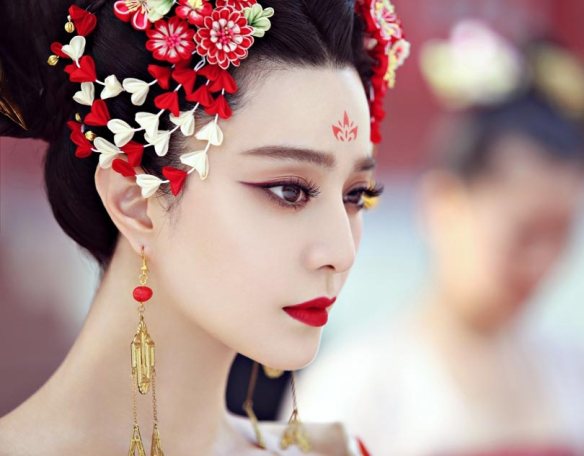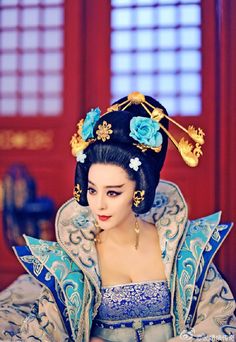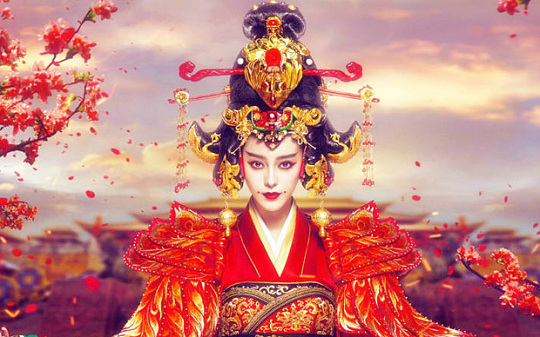Empress Wu, the only female Empress in China, ever. She ruled the Tang Dynasty Empress Wu is one of Dead Queens most popular artwork. The T-Shirts with her likeness is one of our popular items, especially in the black and white version. The original coloured painting by Dawn Pearcey is popular in the Tea Towels and the Pillow Covers. How old is infamous Wu? We are celebrating and commemorating her birthday on February 17. She was born in 624. She ruled as the "Holy and Divine Emperor" of the second Zhou Dynasty, Tang Empire for 15 years.
I came across this blog post on School Girl Milky Crisis about British author, Johnathan Clements. He is the author of Wu: The Chinese Empress Who Schemed, Seduced and Murdered Her Way to Become a Living God. He has written many other books on East Asian history. He is also a scriptwriter.


An Australian student wanted to interview him about his research on Empress Wu. Here is the post below. It's fun, interesting and shows what a power house Wu really was. Read the post below:
Empress Wu and Historiography
Michelle Lam, a student in Australia, emails me with a bunch of questions about conducting historical research on infamous bad-girl Empress Wu. I’ve asked her if I can repeat the interview here…
Michelle Lam: Why did you choose to write a book about Wu Zetian?
Jonathan Clements: My editor had seen that Wu was cropping up on a lot of women-in-history curricula, but that nobody really knew anything about her. She asked me what a book about Wu would be like, and I said that it would be too obscene to read out in public. “Excellent,” she said…
Did you experience any difficulties accessing evidence?
No, the evidence is easy to find. We’ve got evidence coming out of our ears, along with reams of noise. The Old Book of Tang and The New Book of Tang are only a click away if you can read Chinese. There’s a surprising amount of material that survives from the 7th century. Wu’s always been a popular subject, although in recent years, books about her have gone through the roof. I don’t rate a lot of the new Chinese stuff from the last decade, though, as most of it’s just cash-ins, except Meng Man’s work. She’s good.
How much of the evidence was biased?
All of it. Everybody had an agenda when writing about Wu. She’s striking a blow for women. She’s an evil witch-queen whose children despised her. She was a living god who ruled over a golden age. She was the most beautiful woman who ever lived. She was a murderous bitch who staged a palace coup. Take your pick.
How hard was it to discern the truth from evidence that was evidently biased?
There are plenty of issues blocking our path to understanding Wu. There’s a distance of 1300 years, there’s the lost materials that we don’t even know existed in the first place. There’s the ridiculous spin and propaganda of her own regime, and the regimes that replaced her, which seem awfully keen on “alternative facts”. These are common errors of historical practice, and they’re certainly there with Wu’s historiography.
You talk about how hard it is to discern the truth from “evidence that was evidently biased”, but it’s much harder discerning the truth from evidence that seems completely on the level. There is an easy temptation to cherry-pick the best material, not in terms of its persuasiveness, but in terms of how it matches what we call “the mode of emplotment.” Which is to say, most historians want to tell a story with a convenient beginning, middle and end – is it a comedy? Is it a tragedy? Is it a tale full of ironic modern parallels? You can’t cling to a doubtful source or a later interpolation, just because it makes a good story. That’s fine if you’re writing a novel or a bodice-ripper TV show, but not a good enough reason if one is claiming to be a historian.
I found myself using some arcane methods with Wu, such as investigating the “content of the form”, whereby you can work out information by how something is said, or even by what is not said. This method is called abduction, searching for what isn’t there, and, for example, it was what I used when analysing that fantastic speech against Wu, issued in the name of a rebel prince.
“She entered the gate through deception, and all fell before her moth brows. She whispered slander from behind her sleeves, and swayed her master with her vixen flirting. She trampled on the pheasant regalia of the empress, and entrapped her prince in incest. With the heart of a serpent and the nature of a wolf, she gathered sycophants to her cause, and brought destruction to the just.”
And so on. The point with that proclamation is that it doesn’t mention some of the most infamous accusations levelled against Wu by later writers. If you were trying to take down an opponent, you would be sure to mention the most scandalous accusations against them, but Luo Binwang, who wrote those words, doesn’t seem to be aware of them. So we find ourselves in the odd position of using the words of Wu’s enemies to work out which of her alleged crimes didn’t happen. We’re essentially using them as witnesses for the defence.
Do you think your identity and personal opinions played a part in how you presented Wu Zetian in your book?
Certainly. I was once derided by another author for not being Chinese enough or female enough to understand her. Only a Chinese woman could possibly get it, she claimed, entirely unaware or uncaring of how sexist and racist that made her sound. It’s the sort of thing someone says when their identity turns out to be their sole qualification, and it’s a poor substitute for actual knowledge and research.
I would like to think that my personal opinions were less relevant in the construction of the book than my awareness of other people’s. It’s important, I think, to bear in mind that many Chinese historians were misogynists, determined to prove that women should not be given positions of power. This isn’t merely a matter of being bigots, sometimes it also reflects later times with different subtexts, such as periods of Mongol or Manchu rule, when women traditionally wielded more power, and the Han Chinese establishment never liked it. Then there are the later Wu historians determined to establish a parallel with the wife of Chairman Mao, or with Hillary Clinton, and the many, many TV writers determined to present her as some sort of innocent Cinderella or knife-wielding psychopath.
Do you think you were influenced by any external factors whilst writing the book?
What are your personal thoughts on Wu Zetian? What do you think of her as a ruler? What do you think of her as a person?
I was doing an interview with Radio Four when the book came out (you can still find it online but it’s in a dinosaur format that’s difficult to convert), and the presenter suddenly stopped and said: “You really admire her, don’t you?” What I find most incredible about her is the fact that she got to where she was from nothing. When she started in the palace, she was little better than a chambermaid, and yet she was somehow able to run the country for decades. As a ruler, not only in her own right, but behind Gaozong’s throne, she presided over the height of the Tang dynasty. If a male emperor behaved like Wu, nobody would have batted an eyelid, so I see little reason to say that China suffered under her watch. As a person it is harder to say. The few reliable quotes from her lifetime make her sound like she was pretty insufferable. But who wouldn’t be…?
If there was anything you could have done differently whilst researching her person, what would it be?
There are so many rich resources for the Tang dynasty, and if I’d had, say, another month, I could have spent more time poking around the Chinese sources. But I must have been pretty satisfied with the book the way it was, because when we did the second edition recently, the only real changes I made were to update the media references, and for the Chinese-language edition, a new foreword.

Empress Wu is published by Albert Bridge Books.
You can buy the book here.
Title: "Unveiling the Power of Empress Wu Zetian: A Unique Perspective on History, Fashion, and Lifestyle"
Summary: In a recent blog post interview, an expert delves into the intriguing life of Empress Wu Zetian, highlighting her fascinating journey as an ancient Chinese empress. The discussion goes beyond the traditional historical narrative, exploring the dynamics of power and the intricate balance between royal authority and rebellion.
The interview underscores the fascination with historical figures like Empress Wu Zetian, who is celebrated for her strength and determination, even amidst controversy. The conversation delves into the complexities of leadership and the lessons that can be learned from both the royals and rebels of the past.
What sets this blog post apart is its connection to the contemporary world through the Dead Queens Empress Wu Zetian fashion and lifestyle collection. The collection features scarves, t-shirts, tea towels, pillow covers, candles, and soap cakes inspired by the empress's legacy. Dead Queens Empress Wu collection expresses a particular admiration for Empress Wu Zetian's bold and assertive character, incorporating elements of her style into their products.
By featuring queens from history, including Empress Wu Zetian, the collection aims to celebrate the diverse facets of women who wielded power in different ways. The juxtaposition of traditional and modern elements in the fashion and lifestyle items allows customers to connect with the historical narrative in a unique and meaningful manner.
In essence, the collection serves as a bridge between the ancient and the contemporary, drawing inspiration from Empress Wu Zetian's extraordinary journey. From humble beginnings as nothing more than a chambermaid, she defied societal norms to become the only female ruler in Chinese history, ascending to the prestigious title of the Empress of China.
The Dead Queens Empress Wu Zetian collection celebrates not only her strength and resourcefulness but also the resilience of women leaders who, like her, faced adversity and did what was necessary for survival in the complex landscapes of their times.
The collection invites you to reflect on history, embrace empowerment, and find inspiration in the remarkable stories of powerful women, both royals and rebels alike.




